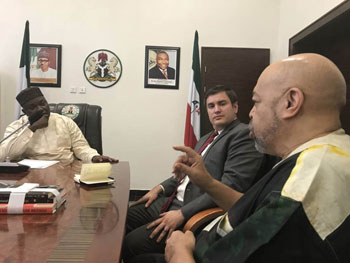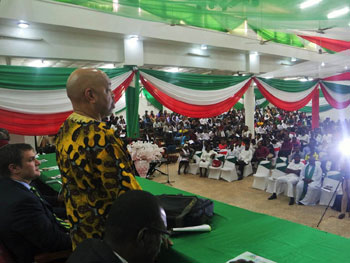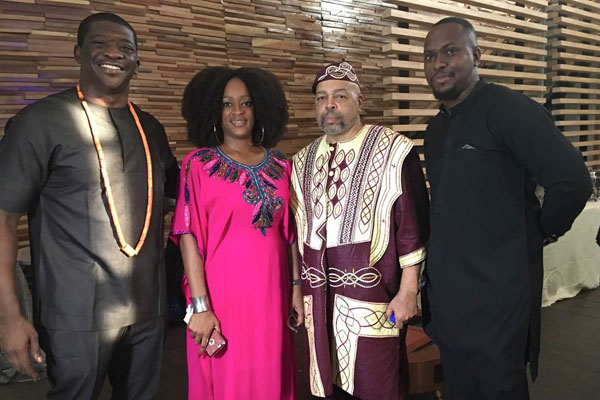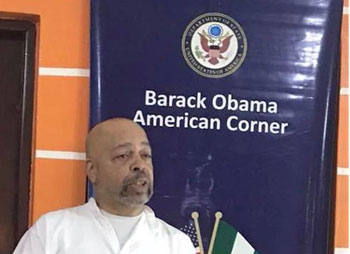- Posted in All University
- Category: Campus News
LINCOLN UNIVERSITY, Pa – What started as a Lincoln alumna and a faculty member catching up, soon became an overseas tour consisting of acclaimed African universities, think tanks, media, and meetings with high level government officials.
 Dr. D. Zizwe Poe speaks with Enugu State Governor Ifeanyi Ugwuanyi at the Enugu Government House in February 2018.
Dr. D. Zizwe Poe speaks with Enugu State Governor Ifeanyi Ugwuanyi at the Enugu Government House in February 2018.In November, Bella Ann Ndubuisi ’09, a U.S. Department of State cultural affairs specialist, invited Professor Zizwe Poe, a Pan-Africana studies and history professor in Lincoln University’s Department of History, Political Science, Philosophy and Religion, to participate as an expert commentator and discussant for the film “Tell Them We Are Rising: The Story of Black Colleges and Universities.”
“We had a lively discussion on the history of HBCUs and Lincoln University,” said Poe, who participated in the discussion via Skype alongside students from nearby universities in Abuja, Nigeria, and staff members from the embassy. The film’s scant recognition of Lincoln University, including its lack of recognition of the Nigeria’s founding president and Lincoln University class of 1930 alumnus, Nnamdi Azikiwe, became a topic of engaging discussion. A similar discussion arose concerning Azikiwe’s influence on the recruitment of Kwame Nkrumah, a member of Lincoln’s classes of 1939 and 41S to Lincoln University and his eventual rise to the Prime Minister and later President of Ghana. The discussion was exciting and added value to Lincoln University’s reputation in Nigeria.
As a result of the discussion, Poe was extended an invitation from Larry Socha, a state department cultural affairs officer in Nigeria, to participate in the embassy’s Black History Month program as a presenter targeting youth empowerment and civic action.

Dr. D. Zizwe Poe engages students at the University of Nigeria, Nsukka, in February 2018.
“I knew right away that this was an amazing opportunity, especially for a Pan-Africanist teaching at Lincoln University,” said Poe.
During his time in Nigeria, Poe presented in the capital city of Abuja, the southeastern State of Enugu, and Lagos, Nigeria’s largest city.
To kick-start his tour in Nigeria, Poe interviewed with Premium Times Nigeria, a Nigerian news outlet in Abuja where he discussed his thoughts on past and present Pan-African leadership. Following his interview, Poe gave a keynote presentation at Abuja’s renowned Thought Pyramid art center. His presentation titled “The Role of Youth in the U.S. Civil Rights Movement” encouraged Nigerian students to use the United States Civil Rights Movement as a model to encourage youth participation in civic affairs, especially the 2019 Nigerian elections.
The following day, Poe participated in a podcast with Sani Mohammed, a U.S. Department of State Information Specialist. In their dialogue, Mohammed and Poe discussed the significance of Black History Month and the lessons learned from it that can be applied to most African countries.

Dr. D. Zizwe Poe (second from right) participates in the Black Panther premier in Lagos, Nigeria, on February 15, 2018.
Later in Enugu, Poe met with Enugu State Governor Ifeanyi Ugwuanyi. During their discussion, Poe mentioned the accomplishments of the recently graduated Nigerian alumni of Lincoln University, a group that was sponsored by the Bayelsan State government of Nigeria.
“The mayor of Enugu seemed impressed by my report of that successful Nigerian project” said Poe.
Poe continued his tour the next morning speaking at the University of Nigeria, Nsukka (UNN), where he discussed the U.S. civil rights movements and their relationship to the African liberation movement. He was joined by Jonah Onuoha, the director of the Centre for African Studies; B.I.C. Ijomah, the chief executive of the Centre for Policy Studies and Research at Delta State; and Benjamin Ozuma, UNN’s vice chancellor. The UNN presentation was special for Poe because Nnamdi Azikiwe was one of the main founding establishers of the university.
After his presentation and discussion at UNN, Poe traveled to the Ofuobi Africa Center, where he gave a presentation titled “Historical Memory and Present Political Realities: The Role of Youth in the U.S. Civil Rights Movement.”
His audience included University students from Godfrey Okoye University, young professionals, as well as the general public. Later in the day, Poe’s tour led him to Babcock University where he encouraged students and faculty to engage in solidarity of African youths, not only in Nigeria but throughout the “African world.”
Poe ended the day by participating in the Nigerian launch of the “Black Panther” screening in Lagos hosted by the U.S. Consulate in honor of Black History Month. Many “Nollywood” actors, actresses, directors and producers were present. Poe was introduced to the theatre audience and gave a brief introduction of the movie.

Dr. D. Zizwe Poe speaks about the U.S. Civil Rights and African Liberation movements at the Barack Obama American Corner in Victoria Island, Lagos, on February 16, 2018.
On the last day of his speaking tour in Nigeria, Poe presented at the Barack Obama American Corner in Lagos and interviewed with Edmond Obilo on his popular radio syndicated show, “State Affairs.” In the interview, Poe discussed issues relating to Pan Africanism in relation to Africa’s future.
Later Poe shared his reflections on the tour.
“It was eye-opening for me on a few fronts. First I was in awe of Lincoln University’s reputation in Nigeria and it showed me that the fruits of our campus’ historic effort in Africa could offer many opportunities for our campus. Secondly, I came away from my encounters with students and professors more convinced than ever that Nkrumah’s formula for African development is more promising now than it was when he first advocated for a United States of Africa. In other words, a new broader nationalism may replace the nation-states inherited from colonialism. That second reflection led to my assessment that Nigeria’s political future will offer options that may shake the foundation of contemporary politics in West Africa in particular and throughout the African continent in general. Nigeria is heading toward the next African revolutionary phase and in that phase the youth will play a significant role.”
View a YouTube video compiled by Poe about the experience.
Article by Devin Bonner, Office of Communications and Public Relations